

Government Debt and Deficits Are Not the Problem. Private Debt Is. There are two quite different perspectives in the set of speeches at this conference.
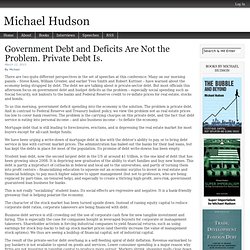
Many on our morning panels – Steve Keen, William Greider, and earlier Yves Smith and Robert Kuttner – have warned about the economy being strapped by debt. The debt we are talking about is private-sector debt. But most officials this afternoon focus on government debt and budget deficits as the problem – especially social spending such as Social Security, not bailouts to the banks and Federal Reserve credit to re-inflate prices for real estate, stocks and bonds.
To us this morning, government deficit spending into the economy is the solution. The problem is private debt. Mortgage debt that is still leading to foreclosures, evictions, and is depressing the real estate market for most buyers except for all-cash hedge funds; We have been urging a write-down of mortgage debt in line with the debtor’s ability to pay, or to bring debt service in line with current market prices. Michael Hudson spricht über Schulden als Ursache von Ungleichheit. Michael Hudson discusses "Junk Economics" at The Democracy Collaborative. D@w Exclusive: Michael Hudson on Junk Economics. NeoLiberalism and the Counter-Enlightenment. Log In Michael Hudson On finance, real estate and the powers of neoliberalism NeoLiberalism and the Counter-Enlightenment May 27, 2010 By Michael Tags: Gordon Brown, Iceland, Latvia, neoliberalism.
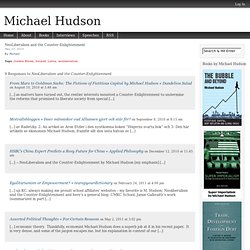
Europe Sacrifices Labour for Finance. The “New Austerity” Road Europe is committing fiscal suicide – and will have little trouble finding allies at this weekend’s G-20 meetings in Toronto.

Despite the deepening Great Recession threatening to bring on outright depression, European Central Bank (ECB) president Jean-Claude Trichet and prime ministers from Britain’s David Cameron to Greece’s George Papandreou (president of the Socialist International) and Canada’s host, Conservative Premier Stephen Harper, are calling for cutbacks in public spending. The United States is playing an ambiguous role. The Obama Administration is all for slashing Social Security and pensions, euphemized as “balancing the budget.”
Wall Street is demanding “realistic” write-downs of state and local pensions in keeping with the “ability to pay” (that is, to pay without taxing real estate, finance or the upper income brackets). There is no way that any mathematical model can come up with a means of paying them. So Mr. Michael Hudson. Michael Hudson: Washington can't call the shots anymore. By Michael Hudson Financial Times, London Monday, June 15, 2009 Challenging the American empire will be the focus of meetings in Yekaterinburg, Russia, today and tomorrow for Chinese President Hu Jintao, Russian President Dmitry Medvedev, and other leaders of the six-nation Shanghai Co-operation Organisation.
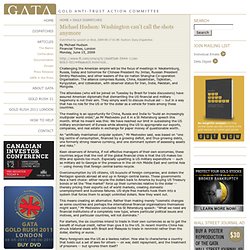
The alliance comprises Russia, China, Kazakhstan, Tajikistan, Kyrgyzstan, and Uzbekistan, with observer status for Iran, India, Pakistan, and Mongolia. The attendees (who will be joined on Tuesday by Brazil for trade discussions) have assured American diplomats that dismantling the US financial and military hegemony is not their aim.
They simply want to discuss mutual aid -- but in a way that has no role for the US or for the dollar as a vehicle for trade among these countries. The meeting is an opportunity for China, Russia and India to "build an increasingly multipolar world order,",as Mr Medvedev put it in a St Petersburg speech this month. Michael Hudson: ‘US wants China to commit economic suicide just like Japan did’ Michael Hudson: ‘US wants China to commit economic suicide just like Japan did’ Home › Headlines › Michael Hudson: ‘US wants China to commit economic suicide just like Japan did’ Michael Hudson: ‘US wants China to commit economic suicide just like Japan did’ Posted on November 10, 2010 by maxkeiser ‹ “We have quite successfully forced this Bank to write off a mortgage” U.K.

Michael Hudson: The Coming European Debt Wars. The Coming European Debt Wars EU Countries sinking into Depression by Prof.
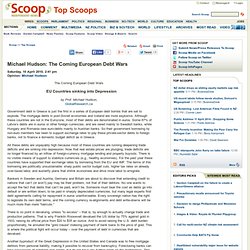
Michael Hudson, GlobalResearch.ca Government debt in Greece is just the first in a series of European debt bombs that are set to explode. The mortgage debts in post-Soviet economies and Iceland are more explosive. All these debts are unpayably high because most of these countries are running deepening trade deficits and are sinking into depression. Bankers in Sweden and Austria, Germany and Britain are about to discover that extending credit to nations that can’t (or won’t) pay may be their problem, not that of their debtors. There is no point in devaluing, unless “to excess” – that is, by enough to actually change trade and production patterns. Another byproduct of the Great Depression in the United States and Canada was to free mortgage debtors from personal liability, making it possible to recover from bankruptcy. Michael Hudson: The IMF Rules the World (Counterpunch, April 6 2009)
Not much substantive news was expected to come out of the G-20 meetings that ended on April 2 in London – certainly no good news was even suggested.

Europe, China and the United States had too deeply distinct interests. American diplomats wanted to lock foreign countries into further dependency on paper dollars. The rest of the world sought a way to avoid giving up real output and ownership of their resources and enterprises for yet more hot-potato dollars. In such cases one expects a parade of smiling faces and statements of mutual respect for each others’ position – so much respect that they have agreed to set up a “study group” or two to kick the diplomatic ball down the road.
Michael Hudson: "Smart Parasites" (Audio) An interview with the Extra Environmentalists on the concepts behind Killing the Host.

The episode is entitled the Age of Stagnation. Friends may appreciate a new higher quality audio recording, thanks to the Extra Environmentalists, who donated a microphone. They write: The common political conversation about our shared economic future focuses on achieving an escape velocity where the post-war growth boom can return as usual. While years of lackluster economic performance mount, a rapidly growing global economy is still discussed like it is readily just over the horizon. Michael H u d s o n (Links) Michael Hudson - How We Got to Junk Economics (1/2) The inversion of Classical Economics.
Days of Revolt: How We Got to Junk Economics In this episode of teleSUR’s Days of Revolt, Chris Hedges interviews economist Michael Hudson on the history of classical economics and explores Marx’s interpretation of capitalism as exploitation – March 22, 2016 CHRIS HEDGES: Hi, I’m Chris Hedges.
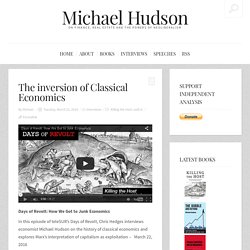
Welcome to Days of Revolt. Today in a two-part series we’re going to be discussing a great Ponzi scheme that not only defines not only the U.S. but the global economy, how we got there, in the first segment, and secondly, where we’re going. Michael Hudson - How We Got to Junk Economics (2/2) Traumatized Worker Syndrome. CHRIS HEDGES: Hi, I’m Chris Hedges.

Welcome to Days of Revolt. Today we’re going to carry out part two of my discussion about where we’re headed economically, with economist Michael Hudson. He’s worked on Wall Street, taught economics, and is the author of Killing the Host: How Financial Parasites and Debt Destroy the Global Economy. Welcome, Michael. Web conference with economist Michael Hudson. "Casino Capitalism": Economist Michael Hudson on What’s Behind the Stock Market’s Rollercoaster Ride. Michael Hudson - How We Got to Junk Economics (1/2) The inversion of Classical Economics.